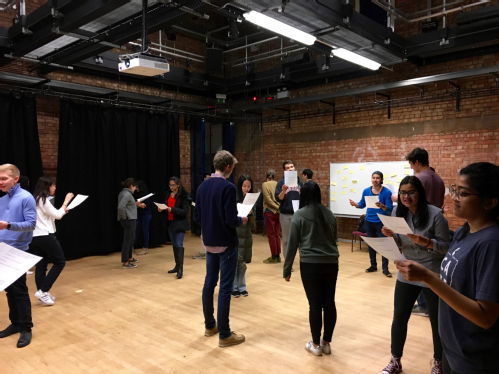What do economists do all day? Economists study data to spot trends in economic activity and assess what’s going on in the economy, government and markets. They communicate precisely and concisely, focussing on the most relevant information, making recommendations about ways to respond to these trends as they begin.
But whilst these are the things we expect professional economists to be able to do all day, often, fledgling economists have all the technical skill but lack the art-of-communication frill.
The ambition behind ‘Telling data stories’ is to better equip students with the hands-on practical skills of a real-life economist, ultimately to provide them with the opportunity to exceed in life, as well as just in exams.

In March this year, the Humanities Studio became home to the telling data stories workshop – for economists this is an unfamiliar space. As students entered the black box, “am I in the right place?” was visible, even if not audible.
Once in the space, students were greeted by distinguished drama education practitioner, Rachel Dickenson, and a circle of chairs. Shoulders hunched, eyes down, students took to their seats. It wasn’t long before Rachel got them talking. First, just a simple introduction. But the simplest things can sometimes be the most challenging (for economists, at least) – even saying one’s own name in a clear confident voice.
The workshop moved students through introducing themselves to introducing each other, saying a name out loud with purpose. This was clearly a step out of the comfort zone for many students, which (without being too malevolent) was exactly what I’d hoped to see.
Then, the chairs were gone and students were on their feet. Different practical exercises, developed in the rehearsal room, brought challenges related to tone, audience, body language and message to the fore. This being a pilot, I didn’t really know what to expect – how would our students handle these challenges? The answer: head on … in every case.
The workshop has helped me to start to look from audiences' perspective on my presentations as well as made me pay more attention to aspects not related to content (such as pace, voice and body language) during the presentation.
The unease certainly ebbed and flowed but the students’ willingness to take on the challenge was remarkable – particularly considering the starting point. It was clear that putting students in the safe open space allowed them to experiment with their own physicality in ways perhaps they’d never done before. But I think crucial to all of this was provocation of constant reflection on what they’d just done, why they’d approached it in a certain way and what they might do differently next time and why.
I learnt the importance of not showing your inhibitions through body language! I learnt how important it was to be spontaneous and talk to new people and learnt to create eye contact, which is very crucial to have an effective conversation with someone.
It was my hope that students would take away just a nugget of extra confidence from the workshop and perhaps not dread giving presentations quite so much going forward. But this relies on instilling in students a different approach to communication in general and oral presentations in particular – not something that can be done in two hours.
I received tips on calming myself and to better understand the balance of giving a presentation and hence feel more comfortable in front of a crowd. I just wished I had gone for the course before doing my History presentation.
Importantly, students took away the message that being a good presenter and communicator takes practice. Indeed, this is what the rehearsal room is: a practice space. Thanks to IATL funding, I have been able to experiment with techniques that require going beyond the traditional classroom environment. When it comes to opening up where communication is concerned, the signs of the virtues of challenging students to step outside their comfort zone are all there.
I learnt that presenting can be less daunting than one may think if I just open up and relax while carrying out the presentation. I would highly recommend the development of a programme of similar workshops.
Through the use of drama techniques, students began to discover an awareness of their own voices and body language, as well as how to use them in speaking in front of a group. It is now up to us to think about how we might implement these techniques in a series of fully-fledged workshops that are available to every student on the economics course – a tall ask, for which I don’t yet have all the answers. TBC …

